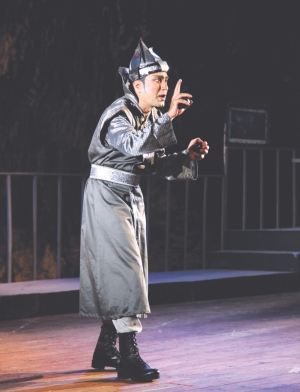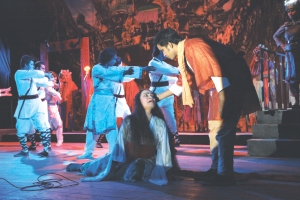| Home - Back Issues - The Team - Contact Us |
 |
| Volume 11 |Issue 16 | April 20, 2012 | |
|
|
Theatre Breaking Cultural Barriers Theatre's production of Tagore's play 'Muktodhara' has won over the hearts of Kolkata and New Delhi audience Tamanna Khan
In 1922, Tagore wrote 'Muktodhara' (the Waterfall) in a country not yet sliced into pieces based on religious demarcation. The rivers then flowed down the sacred Himalayas towards the Bay of Bengal, free and uninterrupted. Yet Tagore wrote the play, telling the story of two nations, Uttarkut and Shibtarai, where water becomes a basis for dominance and control; technological and scientific advancement becomes a showdown of political power, a malevolent way of gaining popularity. Perhaps, Tagore had guessed how freedom would make rivers captive, turning his favourite mighty Padma into a lifeless channel. Fortunately, for him, he did not have to witness this disaster. Today, with the failure of the Teesta water sharing deal, India's decision to build another dam on the Tipai River and India's court ruling approving the river linking project, deltaic Bangladesh's environment and agriculture are under threat. While Bangladesh's position with regards to India is reflected in the relationship between the powerful kingdom Uttarkut and the subdued people of Shibtarai, one can find the shadow of Mamata Banerjee in the haughty assertions of the king of Uttarkut. His strategies to keep his subjects under the illusion of happiness by pronouncing the greatness of machines, which will help them to exercise power over the citizens of Shibtarai, can only remind one about Mamata's role in the Teesta issue. However, Theatre's beautiful and unique presentation of 'Muktodhara' on the stages of Kolkata and Delhi made the audience forget all the contentious issues between the two countries. Tagore, through his own greatness, once again stepped forward to unite the people. Breaking all the narrow-minded political differences, the two nations India and Bangladesh, who have inherited the Noble Laureate, celebrated his 150th birth anniversary. The celebration started last year in May. Cultural exchanges have been taking place between the two countries and will continue till May 2012. Last year, Indian performers visited Bangladesh with cultural troupes. This year since April, Bangladeshi artistes are performing in different cities in India on invitation from the Indian Cultural Ministry. Theatre, headed by noted cultural activist personality and president of International Theatre Institute (ITI), Ramendu Majumdar, led a 35 member delegation to India, to stage 'Muktodhara' in Kolkata's Eastern Zonal Cultural Centre Complex and New Delhi's prestigious Kamani auditorium. 'Muktodhara' directed by Naila Azad Nupur is one of the 14 plays of Tagore that have been financed by the Ministry of Cultural Affairs, Bangladesh on occasion of his 150th birth anniversary. Majumdar informs that the committee of Tagore's 150th birth anniversary celebration that deals with plays initially selected four productions for staging in India. At the final stage of selection at the cultural ministry of Bangladesh 'Muktodhara' was chosen. Another play based on Tagore's poem 'Debotar Gras' in Monipuri language produced by Monipuri Theatre was also selected for staging in other Indian cities. “This will ensure a representation of our ethnic minority and the fact that Tagore's play has been produced in languages other than Bangla. So, it was decided to that 'Debotar Gras' would be staged in those cities such as Agartala and Shilchor, where people understand the Monipuri language,” informs Majumdar, who was in one of the selection committees.
As the production advisor of Theatre, Majumdar states the reason for choosing 'Muktodhara'. “We felt that 'Muktodhara' is a very relevant play in today's context when climate change, global warming, and building dams to control water flow are happening worldwide,” he explains adding that although Theatre had produced plays based on Tagore's novels beforehand this is the first time the company has worked with an original Tagore play. Nupur, to whom Tagore is an epitome of literary and cultural excellence, is excited to be able to direct 'Muktodhara'. Nupur has brought variation in costumes, giving the performers a more universal appearance so that they are not restricted to any era or region. “Our source of water is the Himalayas and there are many indigenous cultures living around the Himalayas. Their livelihood is dependent on the waterfalls. There is always the threat from a more powerful external culture to stop that. This [Muktodhara] is a fictionional story but it can always happen. Not only in the Himalayan plain; this can happen in any place,” she says. Her thought is reflected especially in the depiction of the people of Shibtarai, whose colourful dresses, flowery hats, playful and simplistic nature, earned much praise. There is, however, a touch of the Far East, evident particularly in the costume of the citizens of Uttarkut, wearing something similar to a gi (martial art uniform). “By Rabindranath we mean, dhuti-panjabi, but ours added a different perspective. Tai chi (a type of marital art) has been used in our choreography, which is not part of our culture,” informs Rashedul Awal Shaon, who donned the characters of Bijaypal, Kankar and a citizen of Uttarkut in the play. Interestingly, the experimentation Nupur used was not well received by Dhaka's crowd although just the opposite happened in India, she informs. “In Kolkata, many seniors, educated people and intellectuals came to watch the show. All of them appreciated it,” she says. “Not a single person in Dhaka made any comment,” she rues about all the seven shows held in Dhaka. “I did not consciously give it a new look,” she says, “I did what I felt absolutely was an organic experience.” It was interesting to find even non-Bengali members of the audience at the show at the Kamani auditorium, New Delhi. Ujita, a school student from Lucknow visiting her grandmother in the capital, came to watch the play. None of them understood Bengali, yet they enjoyed the play. Ujita said that she was amused by the performers' depiction of the silliness and indulgence of the people of Shibtarai. Her grandmother Mrs Lalwani added, “I like the language. The dance and the music were also good.” Language becomes a barrier when staging a Bengali play in a foreign land. However, Ramendu informs that body language and choreography has been used extensively in 'Muktodhara' to make the communication easy. “I think that if the performance is good and if the synopsis of the storyline given to the audience is well written in their language, then a play too can communicate well. However, a heavily dialogue-based play will not communicate well. Therefore, it is important to consider the context and the language of the hosting country, before a play is selected for sending abroad,” says the ITI president. The water of 'Muktodhara', at the end of the play, sweeps away all the differences between the people of Uttarkut and Shibtarai. In resemblance, Theatre's presentation of 'Muktodhara' has flooded the halls of Kolkata and New Delhi with applause and praise. “I believe that our cultural diplomacy is very important because culture is the strong point for Bangladesh,” comments Majumdar. The appreciation 'Muktodhara' has received in India confirms this belief.
Copyright
(R) thedailystar.net 2012 |

